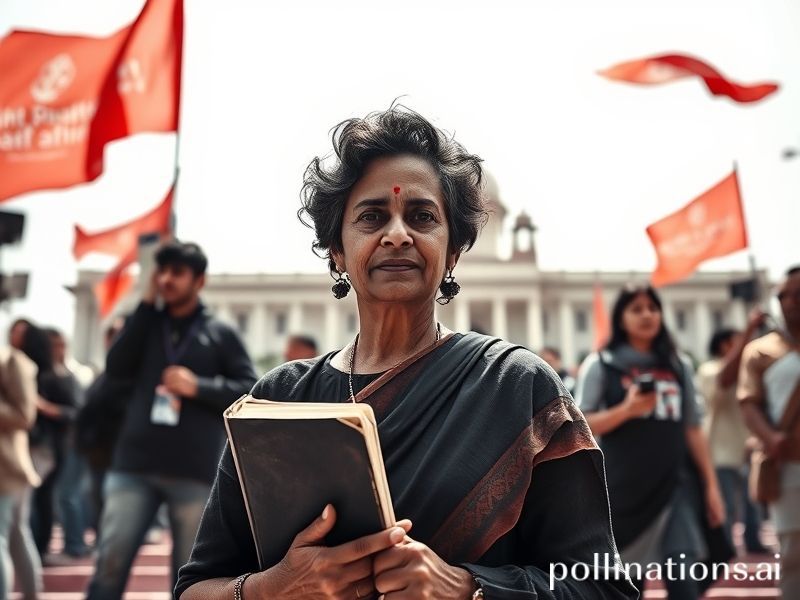Arundhati Roy: The World’s Most Elegantly Prosecuted Oracle
Arundhati Roy, India’s One-Woman UN General Assembly with Better Hair
If the world were a slightly fairer place, Arundhati Roy would be collecting frequent-flier miles for every border her mind has crossed without a visa. Instead, the 62-year-old writer-activist collects court cases the way philatelists hoard stamps—methodically, obsessively, and with a faint air of amusement at the absurdity of it all. To international observers she is either a conscience with a Booker Prize, or a national security threat who also happens to write devastatingly beautiful sentences. Naturally, she is both.
Roy’s newest legal adventure—summoned by Delhi’s High Court for a 2010 speech in which she allegedly questioned India’s claim on Kashmir—arrives just in time for her to join the global club of dissidents who discover that the travel section of their passport is now sponsored by subpoenas. From Moscow to Minneapolis, the pattern is tediously familiar: write something true, wait for the knock. Yet Roy’s particular genius lies in turning each indictment into an international teachable moment, like a TED Talk delivered from the defendant’s box.
For the foreign desk, Roy is useful because she compresses every geopolitical migraine of the 21st century into one compact, sari-clad package. Nuclear nationalism? Check. Climate catastrophe? She’s been chaining herself to trees since before Greta Thunberg learned to bike. Corporate land grabs? Roy can draw you a map with footnotes and casualty counts. Ask a European diplomat why India still buys Russian oil and you’ll get a 12-page non-statement; ask Roy and she’ll hand you a novella-length footnote, half of it footnoted again, footnotes that have footnotes. Bureaucrats hate recursion; it looks too much like accountability.
The global South, forever cast as either victim or consumer, finds in Roy an ungovernable narrator. When she calls the Indian state “a corporate-funded upper-caste Hindu supremacist project wearing democracy like rented jewelry,” she’s not merely trolling New Delhi; she’s handing activists from São Paulo to Johannesburg a ready-made meme. The phrase travels well—short enough for a protest placard, bitter enough to stick. In an era when most dissent is reduced to hashtags, Roy still deals in lethal paragraphs.
Meanwhile, the Global North files her under “exotic troublemaker,” a category that also houses Malala, BTS, and that Swedish kid who keeps skipping school to yell at the UN. Western literary festivals adore her—until she mentions their arms-fair sponsors. Then the moderator suddenly remembers the lunch break. Last year in Berlin she compared the EU’s migration policy to “perfume on a corpse.” The simultaneous translation faltered; the corpse, apparently, had no comment.
Economically, Roy is what happens when neoliberalism tries to price-tag integrity and discovers the market has crashed. Publishers still court her because dissent sells, especially when packaged in Booker glitter. Roy, obligingly, signs the contracts, pockets the advance, then uses the money to bail out Adivasi forest defenders who can’t pronounce “literary advance.” Somewhere a marketing intern weeps into his KPI spreadsheet.
Internationally, Roy matters because she refuses the polite bipolarity of “India versus Pakistan,” “West versus Rest,” or any other binary that keeps arms dealers in business. She insists on a triangulation: the people versus the state versus capital. It’s an awkward geometry for diplomats who prefer straight lines drawn with cruise missiles. Yet in COP corridors and Davos side-rooms, you’ll spot officials sneak-reading Roy under the table like guilty teenagers with contraband poetry, hoping no camera catches them taking notes on how to sound vaguely human.
As the planet’s democracies queue up to criminalize protest, Roy’s predicament offers a darkly comic preview: tomorrow’s dissident will need a literary agent and a defense attorney on speed dial. Until then, she remains our most elegantly prosecuted oracle—proof that in the 21st century, the most subversive act is still to tell a story beautifully enough that someone, somewhere, feels ashamed of their silence.







